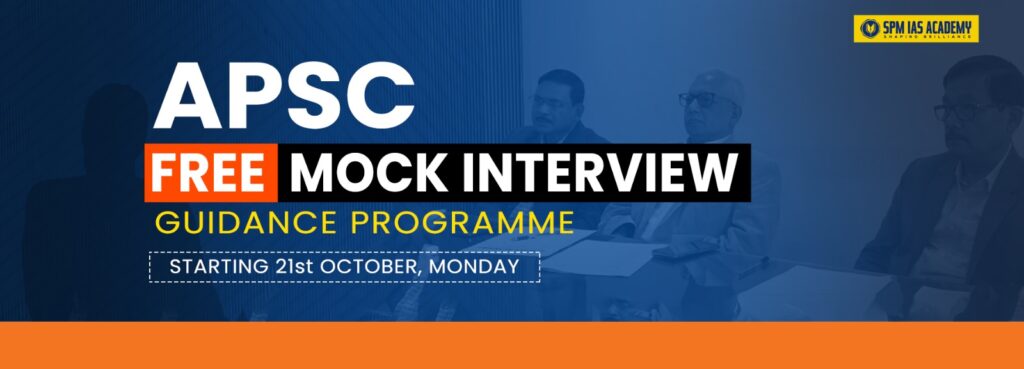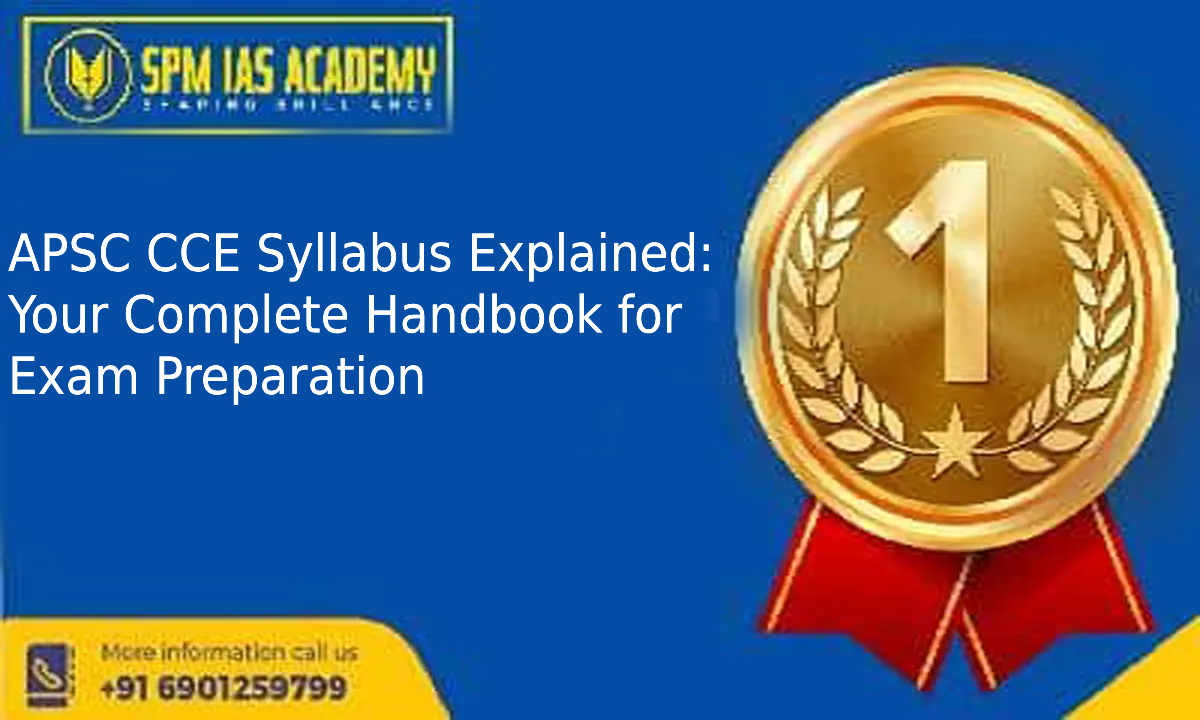APSC CCE Syllabus Explained: Your Complete Handbook for Exam Preparation
Introduction
In the competitive environment of civil services, the Assam Public Service Commission Combined Competitive Examination (APSC CCE) is a difficult task for ambitious bureaucrats. This test requires a complete comprehension of its material since it has the power to affect the destiny of both the candidates and the state. In this blog written in the manner of an editorial, we will go deeply into the APSC CCE curriculum, breaking down its components and throwing light on successful ways for test preparation.
The Significance of the APSC CCE
The APSC CCE is a prominent examination that acts as a doorway to numerous administrative posts within the Assam state government. Exams are held for evaluation candidates for numerous positions in the Assam Civil Service, Assam Revenue Service, Assam Police Service, and different other branches of state as well are administered by the Assam Public Service Commission. These topics included on the exam will allow for a more holistic evaluation of the applicants’ knowledge, analytical capability, and decision-making skills, all of which are essential for competent leadership.
Breaking Down the Syllabus
The APSC CCE curriculum is extensive and includes a broad variety of topics. Aspirants are evaluated not just on how well they know the subject matter, but also on how well they know the world at large and how well they can apply theoretical ideas to real-world issues.
Preliminary Exam – 400 Marks (2hrs each) | |||
Paper | Subject Name | Course | Marks |
Paper-I | General Studies – I |
| 200 |
Paper-II | General Studies – II |
| 200 |
Mains Exam – 2275 Marks, 3hrs each | |||
Paper-III | General Studies – I |
| 250 |
Paper-IV | General Studies – II |
| 250 |
Paper-V | General Studies – III |
| 250 |
Paper-VI | General Studies – IV |
| 250 |
Qualifying Papers-A | Essay |
| 300 |
Qualifying Papers-B | Indian Language (Qualifying) |
| 300 |
General Studies Papers
General Studies – I:
This test evaluates the examinees’ familiarity with Assam and Indian history, culture, as well as geography. It covers a wide range of disciplines, from ancient to contemporary history, art and culture, Indian and world geography, and more.
General Studies – II:
The constitution, polity, government, social justice, and international relations of India are some of the primary topics included in this paper. Candidates must have a thorough knowledge of topics such as the Constitution of India, modern social and political issues, and international organizations.
General Studies – III:
The areas of assessment that are most focused on in this paper are mostly economics, science and technology, and disaster management. The development of the economy, advances in science and technology, and methods for managing natural disasters are some of the topics covered.
General Studies – IV:
Integrity, aptitude, and ethics are the topics covered in this paper. Candidates’ moral and ethical beliefs, their outlook on social concerns, and their capacity for making sound decisions are all evaluated.
Optional Subjects and Language Papers
Candidates are required to select one optional subject from the comprehensive list that is supplied (Lists A and B). Because they carry a large amount of weight in relation to the overall marks, the two papers for the optional topic are of the utmost importance.
List of Optional Subjects
Many different electives are available for the Combined Competitive Examination (CCE) administered by the Assam Public Service Commission (APSC). Candidates can better match their skills and interests to the field they pick through this process. The APSC CCE elective list includes the following:
List A | List B |
Agriculture | Anthropology |
Animal Husbandry & Vet. Sci | Botany |
Anthropology | Chemical Engineering |
Chemistry | Civil Engineering |
Civil Engineering | Commerce & Accountancy |
Commerce & Accountancy | Economics |
Economics | Education |
Education | Electrical Engineering |
Electrical Engineering | Geography |
Geography | Geology |
Geology | History |
History | Law |
Law | Literature |
Literature | Management |
Management | Mathematics |
Mathematics | Mechanical Engineering |
Mechanical Engineering | Medical Science |
Medical Science | Philosophy |
Philosophy | Physics |
Physics | Political Science & IR |
Political Science & IR | Psychology |
Psychology | Public Administration |
Public Administration | Sociology |
Sociology | Statistics |
Statistics | Zoology |
Zoology |
Candidates must choose one optional topic from List A or List B for the APSC CCE. Candidates should consider their own experiences, interests, and skill levels while selecting an elective. The key to success on the exam is picking a topic that is both interesting and manageable for you to study extensively.
Essay Writing
Candidates’ capacity to convey their views in a logical and analytical manner will be evaluated through the essay paper. It includes a broad range of subject areas and frequently requires applicants to demonstrate their understanding of social, economic, political, and environmental concerns.
Indian Language
Candidates’ ability to speak an Indian language selected from a commission-provided list will be evaluated through this qualifying paper. The comprehension of language, as well as grammatical and writing abilities, are the main subjects of this paper.
Checklist for Effective APSC CCE Preparation
Checklist Item | Details |
Understand the Syllabus | Get a thorough comprehension of the contents of each paper and the primary emphasis of the topic. |
Create a Study Plan | You need to efficiently divide your time between the many papers and subjects. |
Focus on Current Affairs | Improve your familiarity with the most recent events occurring in your community, country, and world. |
Develop Strong Basics | Create a solid foundation in the fields that are essential to clear the exam. |
Practice Previous Years’ Papers | Make sure you are familiar with the test format and the different kinds of questions asked in the exam. |
Optimize Time Management | You can efficiently increase your speed and accuracy in answering different questions by practicing with mock exams. |
Choose Optional Wisely | Choose an elective topic that caters to your skills and puts you in the best position to succeed. |
Enhance Writing Skills | Exercise your ability to write essays and improve your language skills. |
Ethical and Moral Awareness | Spend significant time learning about ethical behaviour, integrity, and contemporary societal problems. |
Regular Revision | It is important to constantly review the material in order to strengthen your understanding. |
Best Books to Prepare APSC CCE
Subject | Book’s Name |
Indian History |
|
Indian Polity Paperback |
|
Assam History |
|
Indian Economy |
|
Geography |
|
General English |
|
General Studies |
|
Reasoning |
|
Quantitative Aptitude |
|
Conclusion
To navigate the intricate APSC CCE syllabus successfully, candidates must adopt a well-structured approach and delve deeply into its components. Aspirants should understand the relevance of each paper, choose the right optional topic, and practice regularly. Customizing preparation plans, comprehending the material, and building confidence for the APSC CCE 2023 are easy with the tables and checklists given. APSC CCE preparation requires perseverance, strategic planning, and a thorough understanding of the material. Candidates might improve their chances on this difficult test by deconstructing subjects, prioritizing current issues, and using effective preparation techniques. Remember that the APSC CCE assesses both knowledge and capability as an Assam-focused administrator.
FAQ
- What is the structure of the APSC CCE exam?
General Studies I, II, III, and IV, General English, two Optional Subjects, an Essay, and an Indian Language paper comprise the APSC CCE test. Each paper tests candidates’ knowledge, abilities, and aptitude.
- Is coaching necessary for APSC exam preparation?
Coaching with institutions is not obligatory but with SPM IAS Academy APSC exam preparation can prove beneficial . We offer structured guidance and a tailored approach to syllabus coverage, aiding candidates seeking expert assistance. Nonetheless, candidates can also excel through self-study and disciplined routines, considering personal learning preferences and requirements.
- What’s the APSC exam eligibility?
Education, age, and citizenship are APSC test qualifying requirements. Candidates need a bachelor’s degree from a reputable university and a specified age. The APSC’s official announcement details eligibility requirements.
Frequently Asked Questions
What is the structure of the APSC CCE exam?
General Studies I, II, III, and IV, General English, two Optional Subjects, an Essay, and an Indian Language paper comprise the APSC CCE test. Each paper tests candidates’ knowledge, abilities, and aptitude.
Is coaching necessary for APSC exam preparation?
Coaching with institutions is not obligatory but with SPM IAS Academy APSC exam preparation can prove beneficial . We offer structured guidance and a tailored approach to syllabus coverage, aiding candidates seeking expert assistance. Nonetheless, candidates can also excel through self-study and disciplined routines, considering personal learning preferences and requirements.
What's the APSC exam eligibility?
Education, age, and citizenship are APSC test qualifying requirements. Candidates need a bachelor’s degree from a reputable university and a specified age. The APSC’s official announcement details eligibility requirements.






